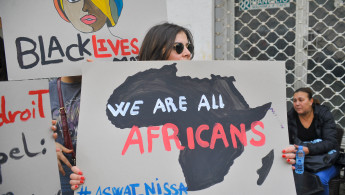Tunis eases migrant 'regularisation', denies Saied's role in racism wave
The Tunisian state announced new measures "in favour" of students and migrants from sub-Saharan Africa and blamed the wide attacks against the community on unspecified "sources."
"Tunisia is astonished at this campaign, whose sources are known, related to alleged racism in Tunisia, and rejects this accusation against the Tunisian state," read the press release by the office of the "Presidency of the Republic" published on Sunday.
Meanwhile, the Presidency of the Republic and the Ministry of Foreign Affairs announced new "measures to improve the situation of foreigners in Tunisia and facilitate the procedures" for regularising their situation.
The North African state will issue one-year residence permits "to students who are nationals of brotherly African countries to facilitate their stay and allow them to periodically renew their documents."
Tunisian authorities will also "extend residence certificates from three to six months" for people from many sub-Saharan countries, such as Côte d'Ivoire, with its citizens benefiting from a three-month visa exemption on entry to Tunisia.
Tunis also wishes to "facilitate voluntary return operations within an organised framework and in coordination with their diplomatic missions".
Migrants who will voluntarily return to their homelands will be “exempted” from penalties amounting to 80 dinars (US$26) every month they are "illegally" in Tunisia.
The Presidency also promised to strengthen health and social assistance to migrants through the Red Crescent while seeking to "fight against all forms of human trafficking and the exploitation of irregular migrants".
A toll-free number for "residents of fellow African countries" has been created to "report any violations against them".
Around 300 Ivorians and Malians were repatriated on Saturday to escape what several witnesses described as "a surge of hatred" since "anti-migrant" statements were made by the Tunisian president.
On 21 February, President Saied said that the presence of "hordes" of illegal immigrants from sub-Saharan Africa was a source of "violence and crime" and was part of a "criminal enterprise" aimed at "changing the demographic composition" from the country.
Around 21,000 sub-Saharans are officially registered in Tunisia, most of whom are in an "irregular" situation. Dozens were arrested during police facies checks in the past two weeks.
Numerous physical attacks have been recorded and migrants have testified to NGOs that they have been chased and robbed by veritable "militias".
Over the weekend, dozens of migrants flocked to their embassies, namely to the headquarters of the Ivory Coast and Mali embassies, after they lost their jobs and homes, according to AFP.
The recent wave of racism also affected black Tunisians, who say they fear being mistaken in public spaces for sub-Saharan migrants and getting attacked by "anti-migrant militants" who support the president's "Great Replacement" theory.





 Follow the Middle East's top stories in English at The New Arab on Google News
Follow the Middle East's top stories in English at The New Arab on Google News


